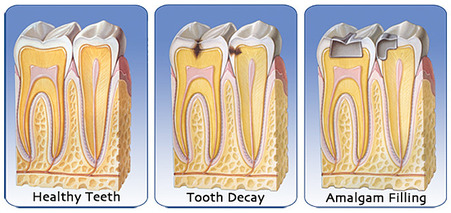
Dental fillings
If you have a cavity that needs a filling, there are different kinds of fillings to do the job. Amalgam are the lowest cost, but composite fillings are by far the most popular. We also specialise in Root Canal treatments too.

Dental fillings, what are they?
If you have a cavity that needs a filling, there are different kinds of fillings to do the job. The two main fillings we do here at Brentwood Village Dental Clinic are Composite Fillings and Amalgam Fillings.
Your dentist cares about your oral health. If you have any questions or concerns about fillings, talk to your dentist. He or she will advise you on the type of filling that works best in your particular case.
Before you get a filling, tell your dentist about changes to your health since your last visit, such as:
• Are you taking any medications?
• Do you have allergies?
• Are you pregnant?
Composite Fillings (tooth-coloured)
Composite fillings are also called plastic or white fillings. To place this filling, your dentist may first give you local anaesthetic (“freezing”) so you do not feel any pain. Your dentist then cleans all decay from the tooth and puts a glue (or bonding material) on the inside of the hole. Composite resin is put into the hole in thin layers. Each layer is hardened with the help of a special light that your dentist holds over the tooth. When the last layer of the filling is hard, your dentist shapes the filling so it looks and feels natural.
Advantages:
• These fillings will be the same colour as your natural teeth so give a more natural look.
Disadvantages
• This kind of filling may break more easily than an amalgam filling and may not last as long.
• Composite fillings cost more than amalgam.
Amalgam Fillings (silver)
Dental amalgam fillings are sometimes called “silver” fillings. Because these fillings are silver in colour, they are primarily used to fill back teeth. They are a mix of metals such as silver, mercury, copper and tin. To place this filling, your dentist may first give you local anaesthetic (“freezing”) so you do not feel any pain. Your dentist then takes out all traces of decay from the tooth and shapes the hole. The amalgam materials are mixed together in a “shaker” and packed into the hole in layers. Unlike a composite filling, which is hardened instantly with a special light, amalgam fillings take time to harden (approximately 24 hours).
Advantages:
• These fillings are the least expensive type of filling.
• They last a long time.
Disadvantages:
• The silver colour may not be aesthetically pleasing.
• They contain mercury (studies have shown that amalgam fillings do not cause illness; they have been used on people for more than 150 years).